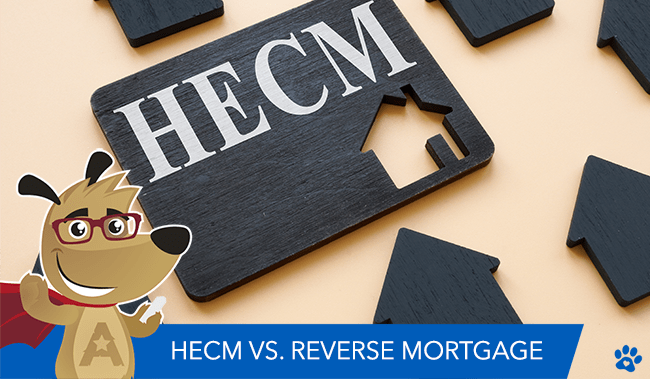HECM vs Reverse Mortgage: Is There a Difference?
Updated March 19, 2025

Let's clear the air at the very start. All HECMs are reverse mortgages, but not all reverse mortgages are HECMs. HECM is the acronym for the HUD/ FHA-insured Home Equity Conversion Mortgage (HECM). It is a valuable tool for senior homeowners looking to tap into the home equity they've built up over the years, but it is not the only reverse mortgage available.
So when you hear someone say "reverse mortgage," they may very well be talking about a HUD HECM loan or one of the many private programs available (often referred to as proprietary or jumbo reverse mortgages).
Let's delve into the world of HECMs at this point, and we will leave the other available reverse mortgages for another day, seeing as the vast majority of all reverse mortgages closed are done with the HECM program. We will seek to shed light on their operation, eligibility criteria, repayment process, and more.
Meet the expert
Michael G. Branson, CEO of All Reverse Mortgage, Inc. and moderator of ARLO™, has 45 years of experience in the mortgage banking industry. He has devoted the past 20 years to reverse mortgages exclusively.
Understanding HECMs
As we discussed, HECM is synonymous with the term "reverse mortgage."
The concept behind a reverse mortgage involves leveraging the equity in your home as collateral to secure a loan while allowing the interest to accrue and be added to the balance rather than requiring the borrower to make monthly repayments. This unique financial instrument allows senior homeowners to access funds in several different ways without making monthly payments.
How HECMs work and their primary purpose
With a HECM loan, the lender uses a HUD-approved appraiser to determine the equity available in your primary residence and extends a loan based on that equity. Although the lender must decide and close the loan with their funds, it is a joint process with HUD through their systems and FHA from the start. The lender receives a "Case Number" from HUD, orders the appraisal from a HUD-approved appraiser, and logs it into the HUD appraisal portal, allowing HUD to review the appraisal even before the lender can issue a loan approval. If HUD deems it is warranted, a second appraisal may be required before the lender can issue the approval. So, while the lender underwrites the loan to HUD program rules and parameters, HUD must then insure the loan after the loan closes, and if the loan does not meet their requirements, they can reject the insurance request.
What does all this mean to the borrower? While all lenders may interpret those HUD rules slightly differently, they all refer to the same manuals, and the differences will be minimal. What sets HECMs apart from other loans is that you aren't required to make regular interest payments. Instead, the interest accumulates and is added to the outstanding balance.
This means that the loan balance may increase over time, allowing you to access your equity without the burden of monthly payments.
What sets one lender apart is how well they service their borrowers. Independent rating agencies like Better Business Bureau and Google Reviews are good for borrowers to know how their HECM lender has previously treated other borrowers.
HECMs serve a crucial purpose in senior homeownership by providing a financial lifeline for those who may not qualify for traditional loans but have substantial home equity. They empower you to access a portion of your home's equity while retaining ownership and the ability to reside in the property for life without making any mortgage payments (you must pay your taxes, insurance, and other property charges like HOA dues on time).
Clarifying terminology
Legal and regulatory distinctions
One critical aspect of HECMs is that they're insured by the U.S. Department of Housing and Urban Development (HUD), similar to other FHA programs. This insurance safeguards borrowers against predatory practices and provides security for lending institutions.
Who qualifies for HECMs?
Several factors determine the maximum loan amount, the most important of which is your age (62 years or older), with older borrowers potentially qualifying for higher amounts. Additionally, you need sufficient equity in your primary residence to meet HECM qualifications.
While the eligibility criteria for HECMs are mainly consistent with those of other reverse mortgage options, there may be differences in upfront costs. As such, potential borrowers should consult with multiple lenders for the most favorable terms.
» Looking for reputable lenders? Try these top banks.
Comparing HECMs and reverse mortgages
Let's see how HECMs and reverse mortgages compare based on various criteria:
| Criteria | Home Equity Conversion Mortgage (HECM) | Proprietary Reverse Mortgage |
|---|---|---|
| Borrower minimum age | 62 | 55 |
| Line of credit term | Lifetime | 10 years |
| May be frozen | No | Yes |
| Line of credit growth rate | Yes | No |
| $0 monthly payment option | Yes | Yes |
| Income requirements | Limited | Limited |
| Credit score | No Minimum | 620 |
| Reserves | No | No |
| Low/no closing costs | No | Yes |
| Fixed interest rate | Yes | Yes |
Curious how a reverse mortgage compares to a HELOC? Check out our article "Reverse Mortgage vs HELOC – What's the Smarter Choice?"
Loan types and payout options
Varieties of HECMs
HECMs offer the choice between fixed-rate and adjustable-rate programs.
- Fixed-rate mortgages have a fixed rate that will not change over the life of the loan
- Allow for only one draw, and all funds must be taken at the close of the loan
- This may require borrowers to lose some of the available proceeds if the initial restriction of funds will not allow them to take all funds that would otherwise be available
- If the balance is paid down, funds cannot be reborrowed
- Adjustable-rate mortgages have rates that can go up or down
- Allow for multiple draws as long as there are still funds left on the line of credit
- Borrowers do not lose availability of funds as any initially restricted funds become available after 12 months, and with the adjustable rate loan, the borrower can take another draw at that time
- If funds are paid down, funds can be reborrowed
You can access funds from HECMs in various ways. The fixed-rate loan requires one initial draw of all funds available, but the adjustable rate line of credit allows for much more flexibility, including a lump sum and fixed monthly payments, or you can draw as needed. The interest is calculated based on the monthly outstanding balance, providing flexibility for covering expenses like long-term in-home care.
Understanding loan repayment
Over time, your HECM balance may increase as the monthly interest accrues. One of the outstanding features of the HECM loan is that no matter how much the loan balance grows, due to the non-recourse nature of the loan, the lender has only the property as collateral for the debt. This means that if the balance exceeds the home's value when the borrower passes, neither the borrower's estate nor the heirs will have to pay the shortfall. In fact, if heirs want to keep a home worth less than the amount owed, HUD will accept 95% of the current appraised value, no matter how much below the actual amount owed.
As a borrower, you're responsible for paying property taxes and maintaining insurance, but these expenses cannot be added to the loan balance like interest can.
In the event of a death or should you and your spouse move out of the property, you must inform the lender as the loan will become due. Typically, the loan is repaid through the sale of the property. If the sale price exceeds the mortgage balance, heirs aren't liable for the shortfall, as the HECM is structured to prevent a short sale.
» Wondering what'll happen to your heirs in the event of a death? Find the answers here.
The importance of financial counseling
Before securing a HECM, you must undergo HECM counseling. This counseling will give you a comprehensive understanding of the qualification process and the loan's terms and structure, ensuring you make an informed decision about your financial future. While it's mandatory for borrowers, heirs are encouraged to attend to grasp the program's intricacies.
Determining borrowing limits
The maximum loan limits for HECMs align with typical FHA loan limits. Individual loan amounts are influenced by your age and current interest rates at the time of application.
Exploring costs and fees
Fees associated with HECMs can vary from lender to lender. As a general guideline, you can expect an origination fee of 1-2% of the loan amount, which can typically be added to the loan balance. Other fees, such as appraisal, recording, and title search fees, may also apply at closing and can be added to the loan or paid out of pocket. To ensure the most favorable terms, comparing costs from multiple lenders is essential.
Protecting consumers through regulation
HECMs are subject to strict regulation by the U.S. Department of Housing and Urban Development (HUD), the same agency overseeing all FHA lending in the United States. This rigorous oversight is in place to protect both borrowers and lenders and ensures that HECMs adhere to ethical and transparent practices.
Maximize your retirement years with HECMs
HECMs and reverse mortgages provide flexibility and the peace of mind that comes with regulatory oversight, making them a valuable option for those looking to enhance their retirement years. The best way to make an informed decision regarding these financial instruments is to consider your options carefully, seek financial counseling, and explore the terms and costs of various lenders.
» Find out how much you'll qualify for with this Reverse Mortgage Calculator.





